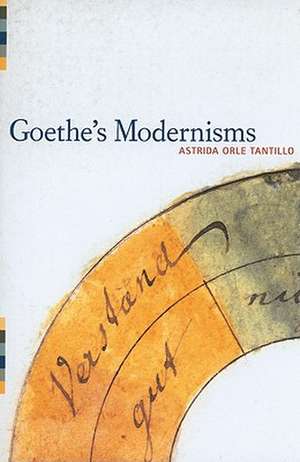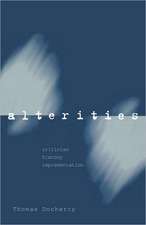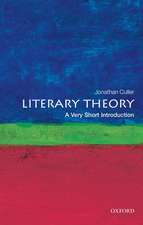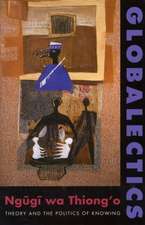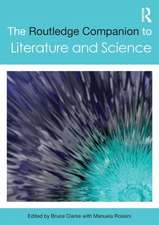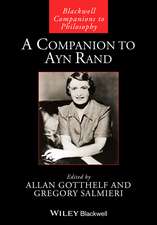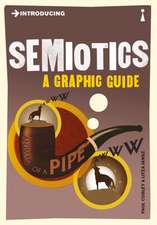Goethe's Modernisms
Autor Professor Astrida Orle Tantilloen Limba Engleză Paperback – 7 iul 2010
| Toate formatele și edițiile | Preț | Express |
|---|---|---|
| Paperback (1) | 239.14 lei 6-8 săpt. | |
| Bloomsbury Publishing – 7 iul 2010 | 239.14 lei 6-8 săpt. | |
| Hardback (1) | 714.92 lei 6-8 săpt. | |
| Bloomsbury Publishing – 7 iul 2010 | 714.92 lei 6-8 săpt. |
Preț: 239.14 lei
Preț vechi: 274.14 lei
-13% Nou
Puncte Express: 359
Preț estimativ în valută:
45.77€ • 47.60$ • 37.78£
45.77€ • 47.60$ • 37.78£
Carte tipărită la comandă
Livrare economică 14-28 aprilie
Preluare comenzi: 021 569.72.76
Specificații
ISBN-13: 9781441120205
ISBN-10: 1441120203
Pagini: 208
Dimensiuni: 156 x 234 x 20 mm
Greutate: 0.43 kg
Editura: Bloomsbury Publishing
Colecția Continuum
Locul publicării:New York, United States
ISBN-10: 1441120203
Pagini: 208
Dimensiuni: 156 x 234 x 20 mm
Greutate: 0.43 kg
Editura: Bloomsbury Publishing
Colecția Continuum
Locul publicării:New York, United States
Caracteristici
This book demonstrates Johann Wolfgang von Goetheâ?Ts (1749-1832) pivotal influence on the development of modern Western society and reveals him to be one of modernityâ?Ts profoundest critics.
Cuprins
Abbreviations and Goethe Editions
Acknowledgements
Introduction
Goethe's Dynamic Philosophy: The Principle of Compensation
Standards, Values and Contemporary Politics: Aristotle and Rousseau
Reading Goethe for Today
Chapter One: Faust, Capitalism, and Technology
Dynamic Perspectives and Faust
Faust as a Tragedy
Faust's Loss of Soul
Projected Modernisms
Religion in a Capitalist World
Beauty and the New Economy
Chapter Two: Werther the Evangelical
Part I: The Sorrows of Young Werther
Pietism
Werther's Pietism
Werther's Catholic Vestiges
Part II: The Legacy of the Novel
Werther's Shared History with American Evangelicalism
Goethe, Emerson, and American Spiritualism
Hierarchy and Werther's Case against Grammar
Chapter Three: Wilhelm Meister and Progressive Education
Part I: Context and Contemporary Overview
Pedagogy and Human Nature: Aristotle and Rousseau
Teacher-Centered versus Student-Centered Models Today
Part II: Wilhelm Meister's Apprenticeship
The Arts versus Commerce
Aristocratic Education and the Arts
Part III: The Student-Centered and Teacher-Centered Classrooms
Progressive, Student-Centered Models
Business, Teacher-Centered Approaches
Part IV: Wilhelm Meister's Journeyman Years: Hybrid Model of Education
The Pedagogical Province
Reverence
Balancing the Democratic against the Aristocratic
Liberal Education
Goethe's Hybrid Educational Model
Conclusion
Works Cited
Acknowledgements
Introduction
Goethe's Dynamic Philosophy: The Principle of Compensation
Standards, Values and Contemporary Politics: Aristotle and Rousseau
Reading Goethe for Today
Chapter One: Faust, Capitalism, and Technology
Dynamic Perspectives and Faust
Faust as a Tragedy
Faust's Loss of Soul
Projected Modernisms
Religion in a Capitalist World
Beauty and the New Economy
Chapter Two: Werther the Evangelical
Part I: The Sorrows of Young Werther
Pietism
Werther's Pietism
Werther's Catholic Vestiges
Part II: The Legacy of the Novel
Werther's Shared History with American Evangelicalism
Goethe, Emerson, and American Spiritualism
Hierarchy and Werther's Case against Grammar
Chapter Three: Wilhelm Meister and Progressive Education
Part I: Context and Contemporary Overview
Pedagogy and Human Nature: Aristotle and Rousseau
Teacher-Centered versus Student-Centered Models Today
Part II: Wilhelm Meister's Apprenticeship
The Arts versus Commerce
Aristocratic Education and the Arts
Part III: The Student-Centered and Teacher-Centered Classrooms
Progressive, Student-Centered Models
Business, Teacher-Centered Approaches
Part IV: Wilhelm Meister's Journeyman Years: Hybrid Model of Education
The Pedagogical Province
Reverence
Balancing the Democratic against the Aristocratic
Liberal Education
Goethe's Hybrid Educational Model
Conclusion
Works Cited
Recenzii
"In this engaging book Astrida Tantillo performs a double explication. She traces the tension between motion and balance in the work of Goethe, and she extracts from Goethe's texts important lessons for the problems - political, commercial, educational - we face as moderns. A fascinating study." -- Stanley Fish, Davidson-Kahn Distinguished University Professor of Humanities and Law, Florida International University, USA
"This book pleads eloquently for a Goethe still relevant to thinking about the problems facing contemporary American culture--because he provides such 'excellent background to explore the American ideological and cultural divide'. As she deftly weaves together readings of Goethe's major works with the tensions in American culture around issues like the economy, religion, teacher versus student-centered education, and whether grammar or the liberal arts are important, Tantillo shows that Goethe is not the conservative sage he is often taken for, but a prescient and incisive anthropologist of modern culture whose compensatory approach to analysis reveals the identical cultural formations that underlie modern American liberalism and conservatism, New Age spiritualism and Evangelicalism alike. Goethe's Modernisms offers wise, humane, and balanced readings not only of Goethe, but of the social and especially educational issues confronting our culture today." -- Jane K. Brown, Professor of Germanics and Comparative Literature, University of Washington, USA
"Goethe's Modernisms is more than yet another book on a major author who continues to attract readers. The staying power of Goethe's works is derivative of their mirroring of the complex contentiousness of what we regard as 'modern' issues. Central to Astrida Orle Tantillo's inquiry is the question: to what degree do the advantages of applied science and of a democratic culture enervate one's own thoughtful spirituality and erode a sense of community? The 'modernisms' in the title refers to the multilayered quality of modernism as a whole. Tantillo addresses the concept of modernism from a scientific and business point of view. Along with the principles of compensation and equilibrium,Tantillo draws upon an understanding of American-style capitalism that has infiltrated all aspects of our social and intellectual lives. While at first blush the temporal and cultural distance between Goethe's era and our own might appear too great to be bridged easily, the distance quickly evaporates. In detailed and riveting analyses of three major works by Goethe-Werther, Faust, Wilhelm Meister-she clearly marks her text with the experiences of the Bush-Rove years, the controversy occasioned by Lawrence Summers' proposal to export pollution to developing countries, the debate surrounding the No-Child-Left-Behind educational policy, the hope of national renewal with the Obama phenomenon, the renewed anti-intellectualism of mainstream America, and the continuing assault on the liberal arts. Technological advances and enhanced ease of communication have given rise to a lackluster culture of the middle, Tantillo argues. The canon has given way to the cannon; the space of quiet reflection has been undone by the screech of market criers. In contrast to the dominant public discourse that explicitly or implicitly views human development as part of a business plan, Tantillo argues that human growth should actually be about ethics. The purpose of human existence is to make individuals capable of living a meaningful life; that is, one that serves others and not just the self. Human and national flourishing, Goethe taught, depends on principles that lend individual life stability without closing off growth and the possibility of achieving wisdom. Goethe's Modernisms is a resounding critique of the ills of cultural mediocrity in our age." -- John A. McCarthy, Professor of German, Comparative Literature, and European Studies, Vanderbilt University, TN, USA.
"In Goethe's Modernisms Astrida Tantillo offers a model of what literary scholarship should be: a challenging reinterpretation that fully situates Goethe in his historical circumstances while showing how he speaks eloquently to our present age of secular individualism." -- Professor Gerald Graff, Professor of Literature and Education, University of Illinois at Chicago, USA, and 2008 President of the Modern Language Association
"An important tradition of American thinking, exemplified most forcefully by Ralph Waldo Emerson, George Santayana, and Randall Jarrell, holds that the writings of Johann Wolfgang von Goethe bear indispensable instruction on the nature of our modernity. In her new book, Astrida Orle Tantillo renews this American engagement with Goethe. Goethe's Modernisms is not only an original and insightful contribution to Goethe scholarship, but also a book of compelling advocacy on behalf of Goethe's relevance to the intractably complex challenges of the present. I believe it is the beginning of a new chapter in the history of Goethe's impact on American thought." -- David E. Wellbery, LeRoy T. and Margaret Deffenbaugh Carlson University Professor Germanic Studies, Comparative Literature, Committee on Social Thought, and the College, University of Chicago, USA
"Goethe's Modernisms is a major scholarly achievement. It manages to make strikingly original contributions not just to the scholarship on Goethe, but also to our understanding of modernism, modernity, and contemporary Western culture. In beautifully wrought prose, Tantillo evokes modernity's dreams of progress, its melancholia over the loss of tradition, and Goethe's critical perspectives on both. Tantillo derives from her readings of Goethe incisive and utterly insightful commentary on some of the major socio-economic and cultural issues of our time, such as religion, commerce, and education. Goethe's Modernisms should be of major import to anyone teaching and learning in a liberal arts environment in America today." -- Imke Meyer, Professor of German & Chair, Bryn Mawr College, USA
"Goethe's Modernisms is a bold, compelling, and important book. Via new and utterly convincing readings of three of Goethe's seminal literary works, Tantillo offers no less than an informed critique of and compensatory corrective for some of the most egregious excesses in modern American culture in the areas of commerce and economy, religion, and education. Tantillo reveals a masterful knowledge not only of Goethe's literary, scientific, and theoretical works, but also of seminal Western thinkers such as Aristotle, Rousseau, and de Tocqueville, highlighting what these works have to teach us about the pitfalls and potentialities of our own versions of modernity. Tantillo demonstrates how the works of Goethe remain vitally modern and prescient to contemporary cultural discussions in America, and by doing so, she also articulates some of the central failings of modernity - that "progress" is imagined to be inevitable, for example, or that liberals and conservatives often represent two sides of the same coin, each blind to the larger picture. The book is written in a beautifully clear prose, and it is eminently readable." -- Heidi Schlipphacke, Associate Professor of German and European Studies, Old Dominion University
"Does Johann Wolfgang von Goethe, the giant of German letters and contemporary of America's founding fathers, have anything to say about our current situation? Astrida Tantillo certainly thinks so. In three engaging chapters, Tantillo uses Goethe to set the conflicted areas of capitalism, religion, and education in a larger framework. Read this book and you'll not only begin to see American versions of Werther, Faust and Wilhelm Meister in your fellow citizens, you'll also profit from Goethe's wisdom and insight into the art and technique of achieving balance in a complex world. This is applied literature in the very best sense of the word." -- Simon Richter, Professor of Germanic Languages and Literatures, University of Pennsylvania, USA
Goethe's Modernisms presents not only a daring, important, and very readable interpretation of several of Goethe's major works. It combines literary scholarship in the best sense with advocacy for the study of foreign literature and high culture and for the humanities in general in today's colleges, especially on American campuses. The reviewer wishes that not only scholars and students of Goethe, World Literature, or Eighteenth-century Studies will read this book but also (future) administrators, educators, and businesspeople ... Highly Recommended.
"This book pleads eloquently for a Goethe still relevant to thinking about the problems facing contemporary American culture--because he provides such 'excellent background to explore the American ideological and cultural divide'. As she deftly weaves together readings of Goethe's major works with the tensions in American culture around issues like the economy, religion, teacher versus student-centered education, and whether grammar or the liberal arts are important, Tantillo shows that Goethe is not the conservative sage he is often taken for, but a prescient and incisive anthropologist of modern culture whose compensatory approach to analysis reveals the identical cultural formations that underlie modern American liberalism and conservatism, New Age spiritualism and Evangelicalism alike. Goethe's Modernisms offers wise, humane, and balanced readings not only of Goethe, but of the social and especially educational issues confronting our culture today." -- Jane K. Brown, Professor of Germanics and Comparative Literature, University of Washington, USA
"Goethe's Modernisms is more than yet another book on a major author who continues to attract readers. The staying power of Goethe's works is derivative of their mirroring of the complex contentiousness of what we regard as 'modern' issues. Central to Astrida Orle Tantillo's inquiry is the question: to what degree do the advantages of applied science and of a democratic culture enervate one's own thoughtful spirituality and erode a sense of community? The 'modernisms' in the title refers to the multilayered quality of modernism as a whole. Tantillo addresses the concept of modernism from a scientific and business point of view. Along with the principles of compensation and equilibrium,Tantillo draws upon an understanding of American-style capitalism that has infiltrated all aspects of our social and intellectual lives. While at first blush the temporal and cultural distance between Goethe's era and our own might appear too great to be bridged easily, the distance quickly evaporates. In detailed and riveting analyses of three major works by Goethe-Werther, Faust, Wilhelm Meister-she clearly marks her text with the experiences of the Bush-Rove years, the controversy occasioned by Lawrence Summers' proposal to export pollution to developing countries, the debate surrounding the No-Child-Left-Behind educational policy, the hope of national renewal with the Obama phenomenon, the renewed anti-intellectualism of mainstream America, and the continuing assault on the liberal arts. Technological advances and enhanced ease of communication have given rise to a lackluster culture of the middle, Tantillo argues. The canon has given way to the cannon; the space of quiet reflection has been undone by the screech of market criers. In contrast to the dominant public discourse that explicitly or implicitly views human development as part of a business plan, Tantillo argues that human growth should actually be about ethics. The purpose of human existence is to make individuals capable of living a meaningful life; that is, one that serves others and not just the self. Human and national flourishing, Goethe taught, depends on principles that lend individual life stability without closing off growth and the possibility of achieving wisdom. Goethe's Modernisms is a resounding critique of the ills of cultural mediocrity in our age." -- John A. McCarthy, Professor of German, Comparative Literature, and European Studies, Vanderbilt University, TN, USA.
"In Goethe's Modernisms Astrida Tantillo offers a model of what literary scholarship should be: a challenging reinterpretation that fully situates Goethe in his historical circumstances while showing how he speaks eloquently to our present age of secular individualism." -- Professor Gerald Graff, Professor of Literature and Education, University of Illinois at Chicago, USA, and 2008 President of the Modern Language Association
"An important tradition of American thinking, exemplified most forcefully by Ralph Waldo Emerson, George Santayana, and Randall Jarrell, holds that the writings of Johann Wolfgang von Goethe bear indispensable instruction on the nature of our modernity. In her new book, Astrida Orle Tantillo renews this American engagement with Goethe. Goethe's Modernisms is not only an original and insightful contribution to Goethe scholarship, but also a book of compelling advocacy on behalf of Goethe's relevance to the intractably complex challenges of the present. I believe it is the beginning of a new chapter in the history of Goethe's impact on American thought." -- David E. Wellbery, LeRoy T. and Margaret Deffenbaugh Carlson University Professor Germanic Studies, Comparative Literature, Committee on Social Thought, and the College, University of Chicago, USA
"Goethe's Modernisms is a major scholarly achievement. It manages to make strikingly original contributions not just to the scholarship on Goethe, but also to our understanding of modernism, modernity, and contemporary Western culture. In beautifully wrought prose, Tantillo evokes modernity's dreams of progress, its melancholia over the loss of tradition, and Goethe's critical perspectives on both. Tantillo derives from her readings of Goethe incisive and utterly insightful commentary on some of the major socio-economic and cultural issues of our time, such as religion, commerce, and education. Goethe's Modernisms should be of major import to anyone teaching and learning in a liberal arts environment in America today." -- Imke Meyer, Professor of German & Chair, Bryn Mawr College, USA
"Goethe's Modernisms is a bold, compelling, and important book. Via new and utterly convincing readings of three of Goethe's seminal literary works, Tantillo offers no less than an informed critique of and compensatory corrective for some of the most egregious excesses in modern American culture in the areas of commerce and economy, religion, and education. Tantillo reveals a masterful knowledge not only of Goethe's literary, scientific, and theoretical works, but also of seminal Western thinkers such as Aristotle, Rousseau, and de Tocqueville, highlighting what these works have to teach us about the pitfalls and potentialities of our own versions of modernity. Tantillo demonstrates how the works of Goethe remain vitally modern and prescient to contemporary cultural discussions in America, and by doing so, she also articulates some of the central failings of modernity - that "progress" is imagined to be inevitable, for example, or that liberals and conservatives often represent two sides of the same coin, each blind to the larger picture. The book is written in a beautifully clear prose, and it is eminently readable." -- Heidi Schlipphacke, Associate Professor of German and European Studies, Old Dominion University
"Does Johann Wolfgang von Goethe, the giant of German letters and contemporary of America's founding fathers, have anything to say about our current situation? Astrida Tantillo certainly thinks so. In three engaging chapters, Tantillo uses Goethe to set the conflicted areas of capitalism, religion, and education in a larger framework. Read this book and you'll not only begin to see American versions of Werther, Faust and Wilhelm Meister in your fellow citizens, you'll also profit from Goethe's wisdom and insight into the art and technique of achieving balance in a complex world. This is applied literature in the very best sense of the word." -- Simon Richter, Professor of Germanic Languages and Literatures, University of Pennsylvania, USA
Goethe's Modernisms presents not only a daring, important, and very readable interpretation of several of Goethe's major works. It combines literary scholarship in the best sense with advocacy for the study of foreign literature and high culture and for the humanities in general in today's colleges, especially on American campuses. The reviewer wishes that not only scholars and students of Goethe, World Literature, or Eighteenth-century Studies will read this book but also (future) administrators, educators, and businesspeople ... Highly Recommended.
